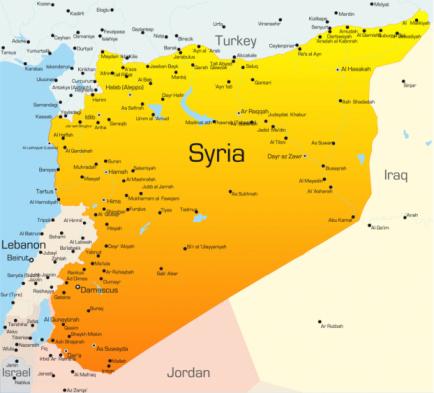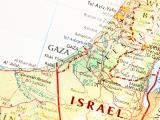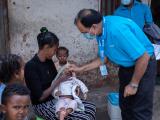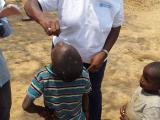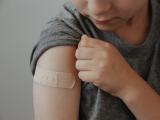In response to the polio outbreak in war-torn Syria, United Nations officials today announced an immunization campaign aiming to reach 20 million children in seven countries over the next 6 months.
Officials also said preliminary evidence suggests that the polio strain in Syria is of Pakistani origin and is similar to the strains detected in sewage in Egypt, Israel, and the Palestinian territories (the West Bank and Gaza Strip) in the past year.
The announcement from the World Health Organization (WHO) and the UN Children's Fund (UNICEF) called the effort "the largest-ever consolidated immunization response in the Middle East." It targets children in Syria, Egypt, Iraq, Jordan, Lebanon, Turkey, and the Palestinian territories.
Syria's polio outbreak is the first there since 1999 and has left 10 children paralyzed. Emergency polio immunization efforts in and around Syria have already reached 650,000 children, including 116,000 in the "highly contested" northeastern province of Deir-ez-Zor, where the outbreak was confirmed last week, the WHO statement said.
It said the campaign aims to reach 1.6 million children in Syria with vaccines against polio, measles, mumps, and rubella. Syria's polio immunization rate has dropped from 90% before the civil war to 68% today.
In Jordan, more than 18,800 children under age 5 in the Za'atari refugee camp have received polio vaccine in the past few days, and a nationwide campaign aims to reach 3.5 million people with polio, measles, and rubella vaccines, the WHO said. A vaccination drive has also been launched in western Iraq, and another will start soon in the country's Kurdistan region.
In addition, Lebanon plans to launch a nationwide immunization campaign later this week, and efforts in Turkey and Egypt are expected to start by mid-November, the agency said.
"The Middle East has shown exactly the coordinated leadership needed to combat a deadline virus: a consolidated and sustained assault on a vaccine-preventable disease and an extraordinary commitment to a common purpose," said Ala Alwan, MD, the WHO's regional director for the Eastern Mediterranean, in the WHO statement.
UNICEF has acquired 1.35 billion doses of polio vaccine so far this year and will have obtained up to 1.7 billion doses by year's end to meet increased demand, the UN agencies said. The Syrian outbreak has increased the pressure on a global supply that was already being stretched, they said.
The Syrian outbreak follows polio outbreaks in the Horn of Africa in recent months and an ongoing trickle of cases in parts of Pakistan where militants have banned vaccination efforts.
European officials have expressed concern that the Syrian outbreak poses a risk of reintroducing the disease in Europe. Two Germans echoed this concern today in a letter published online in The Lancet.
"Vaccinating only Syrian refugees—as has been recommended by the European Centre for Disease Prevention and Control [ECDC]—must be judged as insufficient; more comprehensive measures should be taken into consideration," write Martin Eichner of the University of Tubingen and Stefan O. Brockmann of the Regional Public Health Office in Reutlingen.
They suggest that European countries should bring back the use of the oral polio vaccine in place of inactivated polio vaccine and that routine screening of sewage for poliovirus should be considered for settlements with large numbers of Syrian refugees.
Responding via Twitter to the letter today, ECDC Director Marc Sprenger, MD, PhD, said the agency has recommended that European countries assess polio vaccine uptake in their populations and move to improve it if it is less than 90%.
See also:
Nov 8 WHO statement
Nov 8 Lancet letter
Related Nov 5 CIDRAP News item
